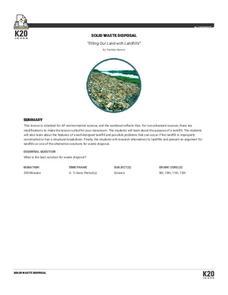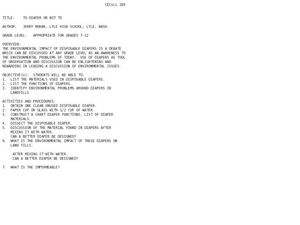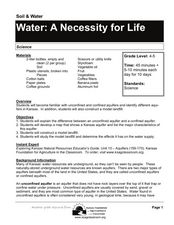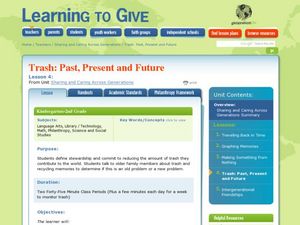K20 Learn
Filling Our Land with Landfills: Solid Waste Disposal
Though it comprises only 5 percent of the world's population, the US generates 40 percent of the world's waste. Scholars learn about landfills, their safety, and other solid waste methods. They use experiments and research to learn more....
Cornell University
Fibers, Dyes, and the Environment
Nanofibers can be made through electrospinning or force spinning in order to reduce the negative impact on the environment. Pupils study the role of fibers and dye on the environment through a series of five hands-on activities. Then,...
Cal Recycle
Conserving Natural Resources
Trying to plan an engaging elementary science unit on natural resources? Conserve your energy! This five-part series of lessons and hands-on activities has exactly what you need to teach young scholars about the importance of conservation.
Purdue University
Food Waste and the Environment
Out of sight out of mind can be a dangerous habit. Learners investigate the life of food waste after it leaves people's homes and its impact on the environment. They complete a series of three activities that involve building a mini...
College Board
2008 AP® Environmental Science Free-Response Questions
Some of the oiliest creatures on earth may be the answer to our energy crisis! Using a four-question assessment, resource scholars consider the use of microalgae as fuel among other environmental science topics. Each question has several...
Teach Engineering
Trash to Treasure!
One person's trash is another man's treasure. Challenge your class to build something useful out of the trash they throw away on a regular basis. Groups design and build a practical item from trash they collect, allowing the class to...
Texas Commission on Environmental Quality
Environmental Sciences
Whether you are teaching environmental science in junior high or studying recycling in kindergarten, there is something for all in this set of lessons designed for environmental education. The 110-page packet comes with tips for...
Tennessee Valley Authority
Renewable Energy Sources
Not all energy sources are renewable, as learners investigate in this unit. Made up of six lessons that span a few weeks of instruction, the unit has learners examining US energy reserves and consumption, using data to draw conclusions...
Curated OER
The Trash We Pass
Where does our garbage go? What is the difference between a recyclable and non-recyclable item? Pose these important, but often overlooked, questions to your class and invite them to consider the lasting and damaging effects of the...
Curated OER
Where Is Away?
Students explore garbage. In this landfill lesson, students investigate how much garbage is collected in landfills on average each day. Students discover hazardous materials that are disposed of improperly and the effects of these...
Curated OER
From There To Here...
Students find out where some of the products in hour homes come from, then become aware of our local trash, landfills and incinerators. They chart and graph data and use maps for different purposes.
Curated OER
To Diaper or Not To
Students list the functions of diapers, and the materials used in disposable diapers; students then identify environmental problems caused by diapers in landfills.
Curated OER
Where Does Al the Waste Go?
Young scholars construct a sanitary mini-landfill and an open mini-dump. Over a thirty day period, they compare the two methods and determine landfills are envorinmentally safer. They observe a demonstration of burning waste. They create...
Curated OER
Recycling-Taking it Easy on the Environment
Students review the garbage/landfill graphs included with the instructional activity. They discuss the information on the graphs and discuss which garbage products come from their homes. Students collect examples of over packaging to...
Curated OER
Talkin' Trash
Use these lesson plans to illustrate the effects of trash on our environment and the ways in which we dispose of it.
Curated OER
Nature's Recycling Program
Students identify what materials make up compost. In this science of recycling lesson, students explain the benefits of composting determine how compost is a good plant fertilizer.
Curated OER
After the Garbage Can: Where Does Our Trash Go?
Students explore how waste disposal has changed over time and what the current issues are. In this disposal lesson students collect data and create graphs.
Curated OER
Water: A Necessity for Life
Young scholars examine types of aquifers and make a model landfill. In this water usage lesson, students determine the difference between confined and unconfined aquifers. They build a model landfill, observe it for two weeks, and...
Curated OER
Applied Science - Built Environment Lab
Students evaluate trash. In this Science lesson, students collect and weigh trash from their classrooms. Students categorize the trash and the corresponding weights, recording the information on a data sheet.
Curated OER
Recycling
Students explore the recycling process. In this recycling lesson, students gain understanding of how garbage is disposed of. Students makes lists of things that can be recycled. Students discuss how animals and plants are damaged by...
Curated OER
Trash: Past, Present and Future
Students explore how much trash they create. For this recycling lesson, students define stewardship and conduct an experiment to see how much trash the class produces in a week. At the end of the week the students propose ways to...
Curated OER
Information, Please!
Students examine how aluminum is recycled. In this recycling lesson, students participate in a field trip to a local recycling center to observe the process of recycling aluminum. Students take notes and report their findings.
Curated OER
What Will Biodegrade?
Young scholars create their own landfill where they observe materials that will and won't biodegrade. In this biodegrading lesson, students discuss the concept of a landfill and what materials biodegrade into soil and which ones stay in...
Curated OER
Recycling Plastics
In this plastics worksheet, students read about how important it is to recycle plastics and why sorting the recycle materials is important. Students then complete 4 short answer questions.

























